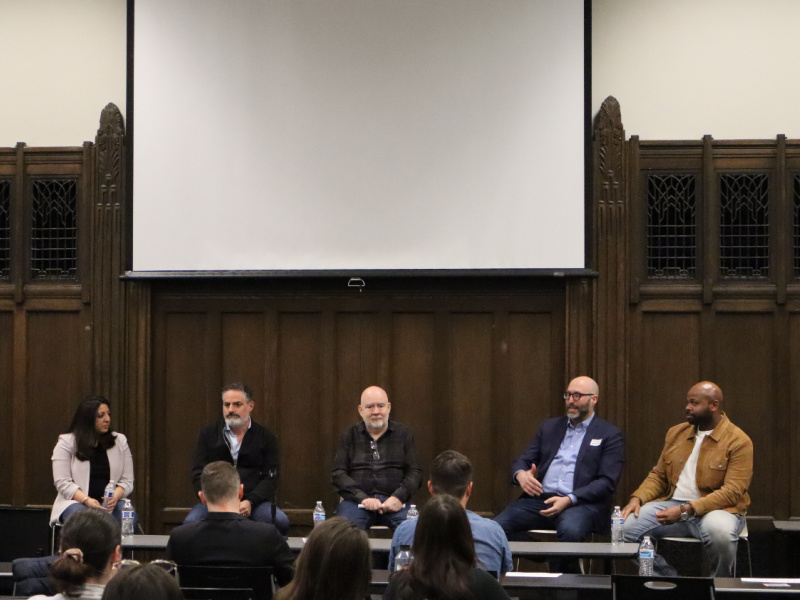Diana Marszalek 06 May 2024 // 7:23PM GMT

CHICAGO — With AI shaking up the PR industry — and causing major angst in the process — communicators should take a cautious approach to adopting the technology to harness the innovation while safeguarding employees from the likes of job losses, deep fakes and plagiarism.
“We are not doomed immediately,” said Bully Pulpit International partner Bradley Akubuiro.
Akubuiro’s comments were part of an April deep dive in Chicago looking at the impact and implications of AI in the marketing, communications and creative industries. The three-part conversation, hosted by Spool with PRovoke Media, featured communicators from a range of backgrounds and perspectives to explore specific ways AI is changing the industry and what communicators need to know about leveraging its power and mitigating its negative impacts.
Akubuiro was one of four panelists who focused on the critical issue of disinformation, and whether AI, which is used to propagate disinformation, can also serve as a remedy. Other participants included Chris Perry, chief innovation officer and chairman of futures at Weber Shandwick; Shilpa Gadhok, founder and CEO of See Good Strategy Group; and Axios reporter Justin Kaufmann.
Perry emphasized the potential of AI tools in detecting and preempting emerging threats, noting their capacity to anticipate significant events before they unfold. However, he cautioned against complacency, citing Weber Shandwick's research indicating a mere 6% of C-suite executives believe disinformation will impact their businesses, highlighting the need for a paradigm shift in approach.
Akubuiro underscored the unprecedented speed and accuracy with which disinformation spreads in the digital realm, emphasizing the critical role of audience susceptibility in perpetuating falsehoods. He emphasized the centrality of trust in combatting disinformation, advocating for proactive measures to foster trust and loyalty among audiences.
Gadhok echoed concerns about the erosion of brand loyalty amidst the deluge of misinformation, highlighting the need for strategic communication efforts to rebuild trust and credibility. Kaufmann expressed apprehensions about the looming threat of deep fakes, stressing the importance of vetting sources and upholding journalistic integrity in an era of digital manipulation.
Perry underscored the evolving nature of media and the imperative for adaptive strategies to navigate this shifting landscape. He emphasized the need for accountability among executives and CEOs, urging them to align rhetoric with action in upholding organizational values and purpose.
Holly Skillin, executive director of corporate affairs at KPMG, and Charlie Baldwin, senior VP of insights and analytics at WE Communications, offered insights into AI's role in predictive analytics, risk management, and stakeholder engagement.
Skillin emphasized the evolving nature of AI, highlighting its capacity to identify emerging trends and anticipate shifts in discourse. She stressed the importance of leveraging generative AI to stay ahead of emerging issues, enabling professionals to anticipate challenges and opportunities proactively.
Baldwin echoed Skillin's sentiments, noting AI's evolution into an advisory role, capable of contextual analysis and scenario planning. While acknowledging AI's growing sophistication, he emphasized the need for human judgment and intuition in crisis management, cautioning against over-reliance on algorithmic solutions.
The discussion also delved into AI's potential limitations, particularly its ability to comprehend human emotions and exhibit empathy. Baldwin acknowledged the strides made in AI's interaction with users but underscored the enduring importance of human empathy and integrity in communication strategies.
Addressing concerns about AI's impact on stakeholder engagement, Baldwin emphasized the value of human presence in decision-making processes. While AI offers valuable insights, he emphasized the irreplaceable role of human intuition and relationships in navigating complex communications landscapes.
A third panel of experts addressed another key question for the comms industry: how can creatives protect themselves and their IP in the AI era?
The panel, comprising Colin Ofloy, Creative Director and Vice President at Spool; Brian Cason, Senior Strategist at Pahnke US; Alan T. Kercinik, Independent Brand Communications Consultant; and Alan Parker, Chief Innovation Officer at Energy BBDO, offered diverse perspectives on the intersection of AI and creative ownership.
Parker framed the debate by drawing parallels between the advent of AI and previous technological disruptions, emphasizing the need for AI to be harnessed as a tool to enhance creative outcomes rather than a threat to artistic integrity.
Kercinik underscored the inherent challenges of embracing change, highlighting the importance of grappling with ethical and regulatory questions surrounding AI-generated content. He raised pertinent queries about the potential need for regulatory frameworks akin to those governing the film industry, signaling the urgency of addressing these complex issues.
Ofloy echoed Kercinik's sentiments, emphasizing the responsibility of brands to uphold authenticity and human connection in their creative endeavors. He called for a collaborative approach to navigating the evolving landscape of AI, urging senior creatives to embrace technological advancements while maintaining ethical standards.
The panelists grappled with fundamental questions about the nature of creativity and authorship in the AI era. Ofloy challenged the notion of granting copyright to non-human entities, underscoring the centrality of human agency in creative expression.
Kercinik delved deeper into the ethical dimensions of AI-generated content, advocating for industry-wide adherence to journalistic standards to uphold integrity and accountability.<



































.jpg)





























.tmb-135x100.png)


